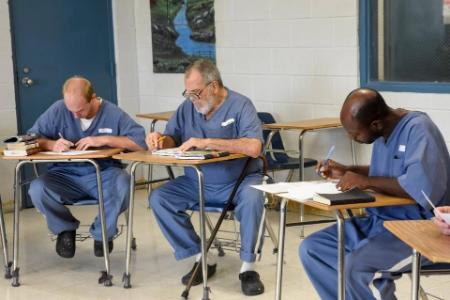The routine for each tutoring session is always the same for University of Miami writing coaches Ben Bogart and Kimberly McGrath. Walk through the metal detector, get patted down by the correctional officers. Affirm they carry no contraband—no cellphone, no weapon, no cash over $60—then cross the courtyard to a large room in another building and wait for their students.
Their classroom may be behind razor wire, their students dressed in baby-blue prison uniforms, and their one-on-one guidance often interrupted for a head count, but the curriculum at Dade Correctional Institution doesn’t vary from what’s taught at the UM Writing Center 30 miles to the north: Improve your sentence structure and critical thinking skills, practice how to edit and revise your stories, manipulate your word choice, work on your prose.
 |
“During the tutoring session, the focus is always on their writing. I don’t know their crimes or even their sentences,” said McGrath, who usually lectures in UM’s English Composition Program but participated in summer tutoring session for Exchange for Change, Inc. “I am impressed by their stories and the topics they write about. Their efforts are amazing.”
A nonprofit organization that promotes dialogue and social change through written partnerships, Exchange for Change usually arranges anonymous writing exchanges between classrooms in prison and classrooms in high school and universities. But in October 2015 Exchange for Change began partnering with UM’s Writing Center to offer one-on-one tutoring to inmates like Allington Dottin. He deems the lessons “essential.”
“If I must list a single improvement it would be my transformation from ‘fiction reporter’ to ‘factual novelist,’” Dottin, 43, told Exchange for Change, which conveyed his remarks to UM. “I had great ideas that fell flat due to the lack of involvement, a paucity of feelings, and an absence of redeeming qualities for my characters. UM tutoring reconciled all these and more.”
Another inmate, Luis Hernandez, 34, credits the program for giving voice to the voiceless. “I am a living example of years when my voice was not heard,” he told Exchange for Change. “Now, through the tutoring and the confidence they give me, I share my voice with anyone who wants to read it. The tutors have so much insight and valuable help to give me, I don’t want to hold back from them because they give my writing more life.”
Joshua Schriftman, associate director of Exchange for Change and another lecturer in UM’s English Composition Program, said many prisoners are working on memoirs and novels and see Bogart and McGrath as often as they can. “We also have students who are very new to the art of writing,” Schriftman said. “We try to accommodate students with all levels of experience. Our goal is to help prisoners develop writing skills and become better writers. That’s really the heart of the program.”
For now, Exchange for Change also offers creative writing courses in four correctional institutions and a juvenile facility in South Florida, but DCI is the only location where tutoring is offered. The organization hopes to expand the tutoring program to other correctional institutions and start additional programs with UM, such as a Spanish-language letter exchange workshop.
Bogart, who also taught a rhetoric course at DCI during the summer, said most of the students “pay attention to the news and write, what I like to call, the ‘State of the Union address’ where they respond to current problems. For example, many students write about the Black Lives Matter movement and what’s happening with the current election.”
McGrath is inspired by seeing how writing can empower people. “In their work, I can hear their voices in a place where their voices are normally unheard. Prison does not have to define who you are in life, and I see how the students’ writings are redefining their lives.”
September 07, 2016

